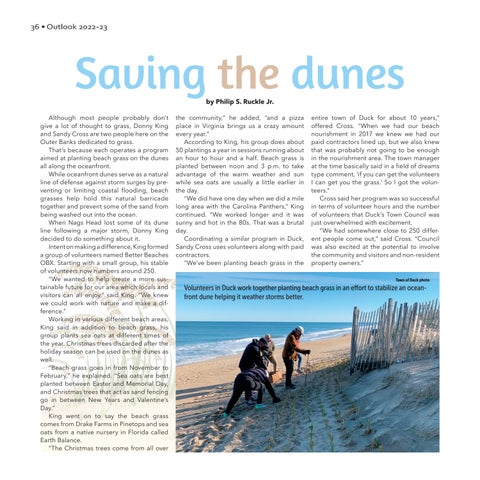36 • Outlook 2022-23
Saving the dunes by Philip S. Ruckle Jr.
Although most people probably don’t give a lot of thought to grass, Donny King and Sandy Cross are two people here on the Outer Banks dedicated to grass. That’s because each operates a program aimed at planting beach grass on the dunes all along the oceanfront. While oceanfront dunes serve as a natural line of defense against storm surges by preventing or limiting coastal flooding, beach grasses help hold this natural barricade together and prevent some of the sand from being washed out into the ocean. When Nags Head lost some of its dune line following a major storm, Donny King decided to do something about it. Intent on making a difference, King formed a group of volunteers named Better Beaches OBX. Starting with a small group, his stable of volunteers now numbers around 250. “We wanted to help create a more sustainable future for our area which locals and visitors can all enjoy,” said King. “We knew we could work with nature and make a difference.” Working in various different beach areas, King said in addition to beach grass, his group plants sea oats at different times of the year. Christmas trees discarded after the holiday season can be used on the dunes as well. “Beach grass goes in from November to February,” he explained. “Sea oats are best planted between Easter and Memorial Day, and Christmas trees that act as sand fencing go in between New Years and Valentine’s Day.” King went on to say the beach grass comes from Drake Farms in Pinetops and sea oats from a native nursery in Florida called Earth Balance. “The Christmas trees come from all over
the community,” he added, “and a pizza place in Virginia brings us a crazy amount every year.” According to King, his group does about 50 plantings a year in sessions running about an hour to hour and a half. Beach grass is planted between noon and 3 p.m. to take advantage of the warm weather and sun while sea oats are usually a little earlier in the day. “We did have one day when we did a mile long area with the Carolina Panthers,” King continued. “We worked longer and it was sunny and hot in the 80s. That was a brutal day. Coordinating a similar program in Duck, Sandy Cross uses volunteers along with paid contractors. “We’ve been planting beach grass in the
entire town of Duck for about 10 years,” offered Cross. “When we had our beach nourishment in 2017 we knew we had our paid contractors lined up, but we also knew that was probably not going to be enough in the nourishment area. The town manager at the time basically said in a field of dreams type comment, ‘if you can get the volunteers I can get you the grass.’ So I got the volunteers.” Cross said her program was so successful in terms of volunteer hours and the number of volunteers that Duck’s Town Council was just overwhelmed with excitement. “We had somewhere close to 250 different people come out,” said Cross. “Council was also excited at the potential to involve the community and visitors and non-resident property owners.” Town of Duck photo
Volunteers in Duck work together planting beach grass in an effort to stabilize an oceanfront dune helping it weather storms better.




















